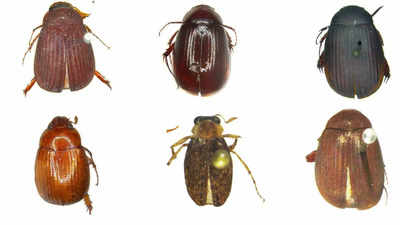New Species of Scarab Beetles Discovered in India
Researchers from the Zoological Survey of India and Germany’s Museum A. Koenig have identified six new species of Sericinae scarab beetles. Their findings, published in the journal Zootaxa, highlight India’s rich but underexplored insect diversity.
Newly Discovered Species
The six new species are:
- Maladera champhaiensis from Mizoram
- Neoserica churachandpurensis from Manipur
- Maladera barasingha, named after the Indian swamp deer
- Maladera lumlaensis and Serica subansiriensis from Arunachal Pradesh
- Maladera onam from Kerala
Each species adds to the biodiversity knowledge of these regions, particularly the Northeast and Western Ghats.
Significance of the Regions
The Northeast India region is part of the Himalayan biodiversity hotspot. It is notable for its high levels of endemism and ecological sensitivity. Five of the newly discovered species were found here, underscoring the need for conservation. The Western Ghats, a UNESCO World Heritage site, is also critical. The discovery of Maladera onam marks the conservation pressures faced by this region.
Ecological and Economic Implications
Studying beetle distribution and ecology has both environmental and economic implications. Some Sericinae beetles act as agricultural pests while others enhance soil health. Early identification can lead to eco-friendly pest control methods. This reduces reliance on harmful chemicals, benefiting farmers and the environment alike.
Importance of Biodiversity
Biodiversity extends beyond rare species. It involves understanding ecosystems, promoting sustainable agriculture, and encouraging ecotourism. Empowering local communities is also vital. The discoveries reinforce the urgency of conservation and international collaboration in protecting biodiversity.
Future Directions
Continued research is essential for documenting species and understanding ecosystems. Intensified sampling in underexplored regions like Northeast India is crucial. This research aids in effective conservation strategies and ecological management.
Month: Current Affairs - April, 2025
Category: Environment Current Affairs








